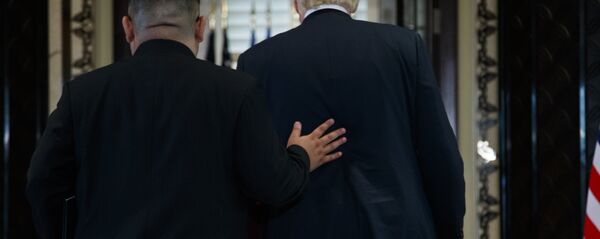"The United States and the Republic of Korea have reached an agreement in principle on a new Special Measures Agreement," the US State Department said in a Tuesday announcement. "Both sides are committed to working out remaining technical issues as quickly as possible."
According to the previous deal, which expired at the end of 2018, Seoul paid 41 percent of the $2 billion bill for US Forces Korea, which amounted to an $848 million check, The Hill reported. The publication noted that 70 percent of those funds went toward paying the salaries of the nearly 9,000 South Korean employees who work with the US military.
The new deal isn't only "significantly more" for South Korea, reportedly approaching $1 billion, according to Stars and Stripes, but has also been reduced from a five-year contract to merely annual, according to Yonhap News Agency.
However, Stars and Stripes noted that Seoul shouldered most of the $10.7 billion cost of upgrading Camp Humphreys, the massive army garrison between Seoul and the demilitarized zone (DMZ) that serves as the headquarters of US Forces Korea. The new HQ, adopted last summer, is twice as far from the DMZ, which serves as the border with North Korea, than its predecessor, US Army Garrison Yongsan, Sputnik reported.
In November, the Pentagon investigated three South Korean firms it claimed had defrauded the US military by vastly overcharging them for fuel supply expenses, Sputnik reported. Hyundai Oilbank, S-Oil Corp and Jier Shin Korea together are accused by US prosecutors of a bid-rigging scheme to milk the Pentagon of over $100 million in excess costs.
In an interview with CBS' "Face the Nation" Sunday, US President Donald Trump dismissed the idea of reducing the strength of US Forces Korea as he prepares for an upcoming summit with North Korean leader Kim Jong Un intended to further progress on denuclearizing the Korean Peninsula. Trump has previously raged about US deployments overseas and threatened to bring US troops home — a policy he's set in motion in Syria already.
North Korea has technically been at war with South Korea and the United States since 1950, since the fighting in the Korean War ended with only a ceasefire and the establishment of the DMZ. While Kim and his South Korean counterpart, Moon Jae In, reached an end-of-war agreement last September and relations between the two countries have significantly relaxed in the last year, no such relationship exists between Pyongyang and Washington, the latter of which still maintains destructive economic sanctions on the country.




